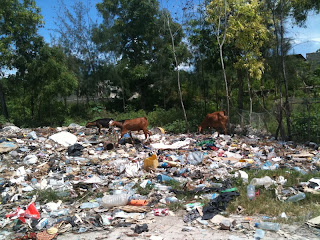I am taking photos of a young goat at a busy Dar es Salaam road. The animal is standing on its hind legs her extended light brown body stretched like rubber. Such an agile creature. Goats, deer and gazelles are athletic animals; and you know what? Delicious too.
No time throughout the history of Tanzania have I seen so much roasted goat meat in our bars and restaurants. The craving and availability of Nyama Choma is as versatile and as fascinating as the goat I am photographing.
Might I be an angry vegetarian who loathes killing animals? Is my intent highlighting the athleticism of Tanzanian goats?
Hardly.
This lithe, elastic and agile goat has interested me because she is feeding on a piece of plastic hanging on an electricity pole.
<--more--!>
“Why are you photographing that particular goat?”
A curious onlooker asks grinning.
“Because I love goats.”
He smiles.
“I can sell her to you.”
“What is the cost?”
“Two hundred thousand shillings.”
I shake my head. “I wouldn’t buy it for twenty thousand.”
“Are you crazy?”
“Maybe.”
“You cannot be serious. That’s a female goat. She can breed hundreds and is still young and fresh.”
I say: “You sound like someone selling her daughter for marriage.”
Having swallowed a thirty long centimetres blue plastic bag, the hungry goat steps down the pole then joins her mates further down the street. Herein lies a pile of rubbish that includes: dry weeds, plastic bottles, twigs, coconut shells, newspapers, fishnets, etc.
I carry on snapping.
The man is still watching; meantime, his attention has also attracted other equally curious onlookers.
A rumour has spread that I am a newspaper man. Someone whispers I am a blogger called Maggid Mjengwa from Iringa. His mate suggests I work with Michuzi.
“Michuzi is a bit bigger.”
“It is his brother.”
“No. It is not Michuzi. This is the Iringa guy.”
“I don’t know why he is so keen on these goats.”
Tired of speculation I clarify that I am photographing these animals because they are eating plastic.
Laughter erupts.
One explains: “Goats eat everything. Bananas, Ugali; even chocolate. Goats are worse than pigs.”
A debate on whether pigs and goats are similar catches fire.
“A pig will eat its own child.”
“Goats are faster eaters.”
“Pigs eat their own faeces.”
After a few minutes I say although goats may eat everything, feeding on plastic is dangerous.
They seem bewildered.
As bewildered and as lost as the taxi driver I was talking to in Zanzibar a few days ago. As we drove from Nungwi past Buku Buku school to Pongwe beach, along that coastal stretch to Darajani, we passed one of the biggest rubbish heaps I have ever seen in East Africa.
You could smell the rotten stench for almost a thousand meters. You heard crows and other birds of prey, shrieking, cawing and chirping, greedily and excitedly. And what else? Goats fed on the discarded food and plastic bags of this ominous, sinister filth.
When I expressed my indignation to our esteemed taxi driver he wondered what was wrong with goats eating plastic.
“You genuinely don’t know the harm found in plastic?”
“No,” he confessed.
He reminded me of a young mother I saw while travelling by boat to Zanzibar. Having cleaned her baby she threw a used nappy into the Indian Ocean.
Those Dar es Salaam roadside guys watching me photographing plastic feeding goats, the Zanzibar taxi driver and this young mother are part of an uninformed, ignorant majority average Tanzanians who do not realise the enormous trouble facing us.
During the last few decades the habit of chucking industrial waste onto our African environment has increased due to expanding use of technology.
Invented over 90 years ago because it is cheap, plastic is made from petroleum and natural gas. Plastics generally contain a variety of toxins such as dioxin, phthalates (restricted by the European Union and USA) and polystyrene (used in food packaging) found to interfere with hormone functions and spreading carcinogens (cancerous elements) and radiation. Due to its durable nature, plastic does not dissolve easily.
According to Wikipedia, since 1950, one billion tons of plastic have been discarded into the environment and will remain in our soils for minimum 500 years.
This affects plants, water and therefore, our food. Goats feeding on plastic contaminate their bodies and the meat we love. It is welcoming news that the government has come down strongly against use of plastic bags in Tanzania. Main concern is whether the policy shall be reinforced. Besides banning plastic bags there is a need to educate the masses why chucking rubbish and especially plastic everywhere including our seas, lakes and rivers where fish live, is very, very bad manners.
Published in Citizen Friday, 11th, November, 2011.


No comments:
Post a Comment